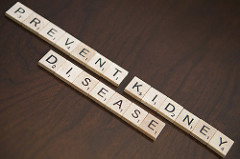The latter stage of kidney disease is also called end-stage kidney disease. This is defined as the time of complete or nearly complete failure of your kidneys to function. They are no longer able to remove wastes, regulate electrolytes or concentrate urine. This advanced state of kidney disease is also called ESRD, end-stage kidney failure or renal failure – end stage.
End-stage kidney disease is the level where the kidneys can no longer function at a level necessary to sustain life. The most common cause of this state in America is diabetes. ESRD generally follows years of chronic kidney failure.
The kidney disease symptoms associated with later stages of the disease include
Unintentional weight loss
Yellow or brown skin
Seizures
Lack of urine output
Vomiting and nausea
Abnormalities in fingernails and toenails
Muscle cramps or twitching
Blood in stools or vomit
Itching
Increased pigmentation
Headache
General feeling of malaise
Frequent hiccups
Fatigue
Easy bruising or bleeding
Decreased output of urine
Decreased sensation in feet and hands
Coma
Delirium and confusion
Drowsiness and lethargy
Decreased alertness
There might be a history of chronic kidney failure over extended years, which progressed to this point. The volume of urine may be decreased, or stop completely.
Your physician may run tests including Creatinine levels to determine how little your kidneys are functioning.
As far as treatment is concerned, dialysis or a kidney transplant are the only treatments for late-stage kidney disease. Symptoms will continue to multiply without one or the other of these treatment options.
There are other treatments you can be given for kidney failure that has been categorized as chronic, but you would not see any progress without also having transplant or dialysis. The added treatment is usually treating aggressively high blood pressure.
You will probably also be ordered treatment for diseases that are affected by tour renal failure, including:
Urinary tract infections
Kidney stones
High blood pressure
Glomerulonephritis
Congestive heart failure
Obstructions of the urinary tract
You may be required to receive blood transfusions, and medications that include erythropoietin and iron to control anemia.
You can modify your diet to help slow the building up of wastes in your bloodstream, and to control other symptoms including vomiting and nausea. You will be asked to eat a high-carbohydrate, low-protein diet, to limit your fluid intake and to limit your intake of phosphorus, potassium, salt and other electrolytes.
A single kidney can function in the capacity of two; if you get a transplant, the healthy kidney should be able to handle your body’s wastes. Without a transplant or dialysis, death will occur as a result of the buildup of waste products and fluids in your body. Both of the treatments have risks, too. The outcome is different from person to person.
To learn about river birch tree, autumn fern and other information, visit the Gardening Central website.

